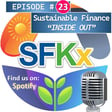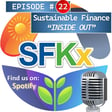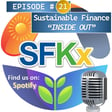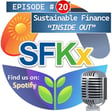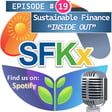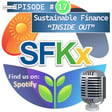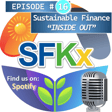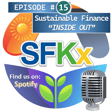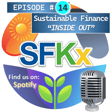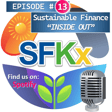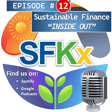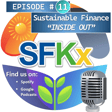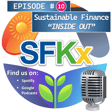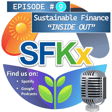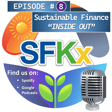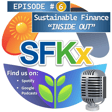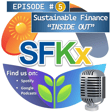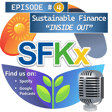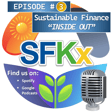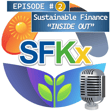Become a Creator today!Start creating today - Share your story with the world!
Start for free
00:00:00
00:00:01

SFKx Podcast Ep. 7 - Sustainable Finance "Inside Out"
https://www.sustainablefinancekx.com
Our last episode for 2023. Thanks for supporting us during our first year and we look forward to sharing more insights and happenings in 2024 again.
Transcript
Introduction and Podcast Overview
00:00:08
Speaker
Welcome and hello again to our next edition of SFKX Sustainable Finance Inside Out Podcast. This is number seven, our final one for 2023. So I guess it's lucky number seven to hopefully finish off a lucky year for some of our listeners.
Market News and Trends with SFKX Guru
00:00:24
Speaker
Now without further delay, let's get to our favorite hombre, SFKX Guru. We'll get him on the airwaves to bring up the speed since our last podcast, which some of you may have noticed was a little while ago now. Apologies for the delay.
00:00:38
Speaker
but we're all about quality, not quantity here at SFKX. So, Mr. Guru, what's the latest in market news and all those juicy tidbits you'd like to bring us? We've certainly missed your dulcet tones, mate, so take us away. Thank you SF, I was going to say SF DJ. You are SF DJ and I'm SF Guru. It is nearly Christmas and you're right, we have been off the airwaves for a little while. I've had new jobs and finishing jobs and Christmas
00:01:07
Speaker
Christmas period's coming up, but we'll try and get into a better rhythm over the next, um, over the next few weeks and have a, uh, a post-cop, uh, debrief and analysis and really whip into the, um, into the next year. But we hope all our listeners is a good, so an official good morning, good evening, good afternoon, and every other salutation in between.
00:01:27
Speaker
So let's dive in.
Climate Bond Initiative and Bond Market Analysis
00:01:30
Speaker
There was a third quarter update from the Climate Bond Initiative, and I'd encourage anyone to have a look at that, although it is mainly
00:01:38
Speaker
bond focused. And we know, look, the biggest pressure point in the market at the moment is just the seasonality on the SLL. So if we look at the linked ones, probably still down 50%, 60%, 70%. If we look at the bond market, actually since the period of preparing this and recording, we'll probably see over the year, and we'll talk about this in our next podcast when we do a bit of a wrap of COP and a wrap of 2023.
00:02:03
Speaker
We'll probably see the bond market edge over the volumes last year, but the linked facilities certainly down. Green continues to consolidate and take more on a use of proceeds basis. The green loans continue to be under a little bit of pressure. SLBs under a bit more pressure, but the broader market has been at a much better November and beyond. So let's pull apart some numbers more on the next podcast.
00:02:31
Speaker
We talked about the pressure on SLLs.
COP28 Outcomes and Climate Finance Predictions
00:02:34
Speaker
Again, we'll also talk about COP28 in terms of what happened, and more importantly, the direction of what some of the statements and intents and all the noise that comes out of it, what we'd like to do at SFKX is talk about, well, what does it mean for transactions and conversations now?
00:02:52
Speaker
10 years in the future. What does it mean now? And we'll talk a little bit about the global stock take, what happened with that, climate finance, blended finance, transition finance. Really, there was a lot of talk about getting money to where it needs to be in more innovative structures. And that's perfect for what we like to do at SFKX is really pull apart those structures, talk about these contextual points, and then see how we can talk about what's happened or what is likely to happen and stimulate some more demand.
00:03:19
Speaker
loss and damage fund, adaptation still the poorer cousin to mitigation, tripling renewable energy, scaling tech, climate tech, biodiversity, nature and a lot of the talk about transitioning away from fossil fuels.
00:03:36
Speaker
That was the worst sneak peek of all time. A fair bit of the kimono opened there, but stay tuned for a bit more of a debrief connected to those different themes, but they're probably the key hooks at this stage.
00:03:55
Speaker
What else have we got here?
Transition Finance and Climate Tech Trends
00:03:57
Speaker
A little bit. Lots of talk about transition. Should we label? Shouldn't we label? What does it mean? How do we do it? Sustainability link bonds and the different aspects of that. And there was an article about Enel.
00:04:14
Speaker
I think I might have even missed some targets, but we don't see that as a huge issue if the targets were ambitious in the first place. Articles about innovation, and I really think 2024 we're going to see a lot about
00:04:29
Speaker
I think we all know now crystal clear whether money is not going and not flowing in this area of at least climate finance, let alone peeling across social finance. So we look forward to getting into that. And I think COP28 has really poised us collectively in the financial community and other parts to really have a look at that.
00:04:53
Speaker
What else have we got here? Investors continuing to drive the market and setting up various funds. A FinTech festival was on again in Singapore. And again, this whole area of climate tech, I think the really interesting thing will be how is that a leading indicator for what we see coming out the pipe to being on a more
00:05:13
Speaker
non-VC, banks, funded type basis. So climate tech, have a look, peel off a few layers, see what's there. We really liked the white paper released from MUFG. They've got a series of white
Reports on Market Insights and Climate Risks
00:05:27
Speaker
papers. There was a detailed white paper released about Indonesia and also Thailand and had some really great bankability matrices in there about various technologies, an excellent model and way to think through the market. So we just wanted to call that
00:05:42
Speaker
call that one out. Science-based targets for Parma or Company. I haven't actually had time to review those in detail. However, some organisations coming out more with reference points on that, which is really good. Physical climate risk also coming out.
00:05:58
Speaker
BlackRock's had some articles on that, some more funds and tools have been released in the market to pull that apart. So hopefully as part of the whole use me adaptation theme, that will be something that's focused upon more for 2024. Catastrophe risks, again, big climate events, big physical climate events and how we de-risk some of those and give some cities some cover around some of those. I think just the new array of tools
00:06:28
Speaker
connected to innovation theme over next year, we're going to see a lot more action on that.
00:06:37
Speaker
ESG is still getting politicized in the US, no major change there. Some more taxonomies coming out and we'll also talk in more detail in the next podcast. A lot of ready and waiting information was the Singapore taxonomy which came out a couple of weeks back as of time of recording. An excellent approach to I guess green, the amber middle ground of transition and obviously some things which are just red but it seems as if most
00:07:07
Speaker
Taxonomies these days are following that sort of structure. So that's good to see.
Sustainability Standards and overlooked Water Issues
00:07:13
Speaker
Biodiversity credits, I think, are kicking around. Unfortunately, COP, we forgot to mention this point, didn't really resolve much on Article 6 or cross-border trading in carbon credits. And sort of the market's really challenged at the moment in various cases.
00:07:28
Speaker
out back west things that have happened or not happened. What else have we got here? ISSB again consolidating as the harmonised versions of disclosure standards for corporates. IEA continuing to pump out a lot of reports on transition, on world energy outlook and various things. So do check that out.
00:07:57
Speaker
If we just go down a bit too, water coming up is a consistent issue and again it just pales in insignificance. There's so much focus on decarbonisation. Again it's a key issue and I agree that these other aspects of sustainability which can actually impact some industries more and we talk about hydrogen a lot. Rarely is the water aspect of that actually talked about
00:08:18
Speaker
as well. Just transition. Wow. I mean, that's just, if you had a Google alert on just transition over the last four weeks, your computer would have blown up. So really good to see that front and center, certainly of COP and of other things. Lots of talk still about fossil fuel financing and transitioning away for that. And I think we're finally
00:08:41
Speaker
at the end or expecting for 2023 more green than fossil fuels and the various ratios of that are a good sort of forward looking indicator into the market. D&V released their annual transition report and that's a super good one. So do check that out about energy
00:09:00
Speaker
energy mixes, growing energy trilamas of security, affordability, sustainability and how that colors a lot of the thinking related to energy transition over time. The paper also pulls apart things like hydrogen, CCUS and different and newer technologies and alternate fuels. So do check that out.
Linked Finance and Emerging Market Trends
00:09:22
Speaker
Oh, where else did we did we get to? I think that's really the the describing the the forest more so than the individual trees this time. But there's just been a lot of more news about those things. So about transition, about adaptation, about biodiversity.
00:09:39
Speaker
about disclosures connected to COP, different types of issues such as water, different types of insurance such as catastrophic risk and some new reference points and white papers getting put out in the market. So I'll probably stop there so it won't explode.
00:10:00
Speaker
and you were or mentioned before we started the podcast that you had some pavlova to test just before Christmas. Has that testing taken place or are you still safe to continue our recording? No, I can safely say that test has taken place and it's a positive. The pavlova is a go. It does connect back to the Agri and third theme, which we will talk also about
00:10:42
Speaker
So thanks for that summary SF Guru. A quick podcast is a good podcast they say. So I'm going to swing straight into our next section. We covered a fair bit in that previous update. So now please take us through recent highlights for linked instruments. If you've managed to catch your breath SF Guru and maybe grab a sip of lemon tea which I know you love.
00:10:52
Speaker
in our COP rundown next month, but very good.
00:11:03
Speaker
Let's get into this next section. I certainly have, but I wouldn't have minded tasting that Pavlova as well. But anyway, enough talk about Pavlova. So into the linked part of the market. Look, we know at the end of the day.
00:11:15
Speaker
Linked loans, bit seasonal at the moment, refinancing. People were stocking those a couple of years back in line with COVID and other things. So on a year-on-year basis, they look like they've been hit pretty hard. I think that's mainly seasonality. Bond market's a bit stronger. So there's always a bit of an interplay between bonds and loans.
00:11:33
Speaker
But in any case, just to highlight more the industries that are coming to market, we still see, you know, 70, 80% of the time, the goals and the KPIs are connected to GHGs, then you've got a lot of goals and targets connected to gender and then variations thereof. So there's still the key items, some things about recycling, some things about water, some things about more the E and the social seems to be dominated still by
00:12:02
Speaker
still by gender at this stage. But if we have a look, some of the banks such as, who we got here, Bank of China have come out, and if you look at the SLL type structures or SLB type structures, most of those are actually use of proceeds type KPIs. It's not for me to say what's definitely better or what isn't, but a lot of the targets in those structures are really counting
00:12:29
Speaker
counting the number of transactions done, which are really user-made proceeds-based transactions. But look, we need all of the instruments, all of the diversification across the market is still a good thing. But on the FI side, I guess one other way to do it, which is probably more scientific, is the individual CO2 performance of your portfolio on finance emissions, rather than just counting the loans happening in certain areas.
00:12:56
Speaker
Okay, fund manager, Castle Rock also did something there, property, capital land in Singapore, Santori over in Japan, did a couple of things.
00:13:13
Speaker
What have we got here? Traffic Ura, again commodities and maybe that's something we see next year a bit more of these different types of commodities and biofuels and things. Again link structures can be very flexible but when the underlying stills some pretty cool products I think that is great. Carrefour looked at another SLB. Chile talked about an SLB and I think issued again possibly its second issuance. Royal Dalton
00:13:42
Speaker
uh fish cars i can't even say that and i know you like your royal dalton um over there sf sf dj and possibly sampling that peb over on the royal dalton as well um helicopters and and uh telcos i think belle sorry not helicopters just on the telco side of their um guanxi financial investment group again some of these fis investment groups really just looking at counting the number of
00:14:10
Speaker
renewables financed and those type of things. One way to do it for sure. Samex again fantastic framework and the approach to the market having done use of proceeds and also even transition various things into the market again with with various elements of this cement making process and having KPIs about the different efficiency rates and different steps and mapping that to the EU taxonomy which is great and also the McDonald's owner.
00:14:39
Speaker
Dorados, I think if I've got that right, I think I've gone to the market again with various things connected to their business and sourcing. So pretty varied, but we know that that linked part is certainly under scrutiny. And I think as we go into 2024, that will ramp up even more as there's more reference points. And really that market's pretty mature now of a good few years. So SFDJ, what do we got next?
00:15:08
Speaker
Thanks again, Gary, you've certainly covered off the full gamut there from Royal Dalton to helicopters to I think our costarados I think they own blow McDonald's in your in your notes as well So you've covered off all industries and sectors now as unusual listeners would be well be aware We now move into the other side of the SF board at this stage of the podcast normally and this is like no other so let's cover off our recent happenings for use of proceeds, please SF guri if you've managed to
00:15:35
Speaker
catch your breath once again.
Sustainable Finance in Sovereign and Banking Sectors
00:15:37
Speaker
I have, absolutely. So I think before we get into just sprinkling a few individual names and transactions across the board, what we've really noticed the last couple of months is the amount of sovereigns wanting to get in this market. Again, sovereigns, yeah, some linked transactions mainly in
00:15:54
Speaker
South America. And then the other thing is the banks are just a huge amount of banks issuing. You've got your main stage utilities and property. So if we look at those three or four areas, we've pretty much covered the bulk of the market, but we're still seeing pockets of interesting activity in relation to autos, in relation to telcos, in relation to data centers and everything else in between. But those four sectors really continue to dominate volumes. So Singapore,
00:16:24
Speaker
did something again, Brazil, Japan's looking at even doing a transition bond in the next year. That's all been in the public domain, so we'll check that out. Sanam, again, labeled as a transition bond for the gas-related operations, a pretty cool transaction there. And then if we move into the banks, we've had all sorts, from Banka Populare de Sandrio,
00:16:48
Speaker
Just to annoy me on the pronunciation, JP Morgan returned to the market, ABC Bank from China, Bank of Investment Development of Vietnam did something as well. So really some different types of institutions within that FI and banking space, ADIB, Banko BPM,
00:17:08
Speaker
Bank, Pacao, Arielle Bank, and I won't go through all the others, but I think we get the idea that that's pretty diversified and slightly different types of institutions coming to market for their funding, which is great. Property, again, pretty high sector. QRead, what else have we got in here? Capital Land, we mentioned. Far East, did a few interesting things there.
00:17:34
Speaker
Mabaldala, Jeepers, that's a difficult one to say, and a few others, Urban Development, Investment Holdings, and some others, again, pretty globally spread on that. If we then look at the other cornerstone of the market utilities, Turner, Red Day, Electrica, Nationale, I think from, sounds Mexican to me, but somewhere in between, Mauritius dipped its toe in the market, EMBW from Europe,
00:18:00
Speaker
And what else have we got here? Some other things, ISSC on the water side, Arab Petroleum Investments Corp, APIC fund. So again, a lot of activity around COP and the Middle East too, just as a broader point.
00:18:17
Speaker
A little bit of nuclear has been talked about again. I think Bruce Power from Canada actually dipped its foot in the market again on a second issuance. And then if we look at housing, that social side, Rhode Island housing and a lot of those Muni type organizations in the US still pretty active.
00:18:37
Speaker
Couple of telcos, Eric's in the boot in the market. Maybe they can reinvent their old clunky, clunky phones, which are certainly etched in my memory. Good fun.
Social Housing Finance and Adaptation Challenges
00:18:49
Speaker
Sell card from Cambodia actually tipped out in the market as well. So again, those four or five main areas still dominate the market. But what we're seeing is just a current of slightly different organizations under that, particularly the banks.
00:19:01
Speaker
And then you've got these other areas around the data and the IT and the enabling and all those things, and different countries thrown in for good measure, which is great. And seafood, La Roy, up from the Nordics, I should say, issuing again, and Mitsubishi electric buses. And that sort of rounds us out on the use of proceeds side.
00:19:28
Speaker
Thanks, SF Guru. This is going a bit off script for a sec, but you mentioned housing a few times there. So am I thinking this is really sort of sociability housing sort of generally? Is that what they're financing? Yeah. So social housing, if you look at the social side, again, broader context, COVID, sorry, let me even give the broader context, broader, broader context, pre COVID, social bonds in isolation were probably 5% of the use of proceeds market across bonds and bonds.
00:19:54
Speaker
Then we've seen social loan principles launched, a little bit more activity. Then what we've seen in COVID is a huge spike in social. Some of that would be housing and amongst all those other things about SME lending and liquidity support and medical and everything else. But if we then
00:20:13
Speaker
roll forward and then look back over the last few years, social gone up, gone back down, but housing has remained a mainstay of that. So SME lending and social based housing based on criteria for certain elements of the population have continued to be, I mean, both of those are probably 60% of the social use of proceeds connected to those things. So it's a key area.
00:20:37
Speaker
And depending on how that's funded, particularly in the US, which has got a big municipal type market, not just a big sovereign market and a little bit different on the corporate market, there's been a fair bit of activity there. So social housing program based will continue to be a good thread within social, although social issued in its own right, only social is probably as low as it's been in the last few years.
00:21:06
Speaker
Gotcha. Now, thanks for the context, SF Guru. Now, that sort of brings us across all our usual sort of topics and sort of sectors we cover. Now we're moving to sort of questions and answers, and Murray, our robot friend, always puts a question to us in each podcast. This one at the moment we've got is one that says, asking the question, you asked the question, actually, SF Guru, why is adaptation hard to finance? Can you please cover that up for us?
00:21:32
Speaker
Yeah, so that's a really good question. And again, a key theme we've talked about this time and time again on the podcast, but it's really been highlighted in copy.
00:21:41
Speaker
And hopefully we start to see some more commitments about getting money into more adaptation. But let's put it this way. There's different aspects of adaptation and it's really mitigation, what you're doing to the environment and stopping or changing that versus adaptation of what the environment is doing to you and how you're getting ready for it. So resilience is a bit of a subset for that and as a bit of a buzzword at the moment, but adaptation, if you're a,
00:22:09
Speaker
It's more in some ways about reducing the impact of a bad event than generating cash flow. So a dollar spent today is going to save $5 in the future. If you have a property company and it's by the coast and you're building seawalls,
00:22:27
Speaker
quite difficult to monetize. If you have a water-related business in a drought-stricken area and you're spending money to try and fix that problem, maybe there's a cash flow related to it. So not all adaptation projects are created equal in terms of their ability to monetize.
00:22:46
Speaker
But versus mitigation, mitigation projects mainly have better payback periods because you're cutting a cost. You're generating something which has a cash flow. Adaptation is more about avoiding a catastrophic event. If a catastrophic event happens, you're not going to be wiped out.
00:23:03
Speaker
you will have some impact. So that's just different. But I think what we're going to see is a lot of agriculture, is a lot of water, these different types of things. And maybe what we're going to see, I was listening to another podcast a couple of weeks ago. Cities, as an example, who are better adapted to and spending money on resilience and getting ready for the effect of the climate on that, maybe they start to get lower insurance premiums.
00:23:29
Speaker
So then that starts to get them loosening the checkbooks and spending money on adaptation because there's a cost benefit somewhere else. So I think we will and we hope to see much more innovative structures to encourage money to that area because not all the time it's connected to an immediate cash flow but you're going to save money if there's an event and some cash flows are related to water and agrarian parts of it. So I hope that does justice to Murray on that one.
00:24:00
Speaker
now i think it's only a thing it's only does uh... now do you do you tell me another sort of query on the uh...
00:24:07
Speaker
Japanese sort of markets or we don't want to leave it for another time.
Japan's Transition Bond and Sustainability Products
00:24:12
Speaker
Let's quickly go over now because I think we don't exactly know when Japan will come out and issue their transition bond. Now I've done a lot of reading on Japan and particularly over the last few weeks for work related activities but Japan has been very progressive about roadmaps in terms of its sort of
00:24:31
Speaker
Preferred approach to transition and there's 22 sectors. It's been really progressive on nutting that out and figuring that out And I think the combination will be partly in the transition bond that they'll do again public domain information Probably back end of Jan or or fed. So let's wait
00:24:49
Speaker
until we see that. But really interesting that they're making a real stand around things connected to nuclear and other parts. But if you actually look at some of their approach to say co firing for gas powered, sorry, gas or I should say coal powered power plants,
00:25:07
Speaker
You know, some of the background is Japan's really constrained on how many options they have for renewable energy and other things. So lots of debates, but they do have a really, really detailed transition plan called the GX transformation. So do check that out as one way that a government has sought to really, really put a lot of details and meat on the bones rather than just have the bone. So it's great to see and then back it up with some issuance.
00:25:35
Speaker
to flesh out some support for those particular areas and things like hydrogen, things like CCUS, all those newer technologies I think will get a crack at the money from this pot too. So again, the context of a country determines that and it's really good to see a country
00:25:56
Speaker
going into immense detail on not just having the bones of NeoNet Zero 2050. Well, what's the roadmap to get there? What are the preferred pathways? What are the supported projects? How are we going to do this? Like corporates, it's easy to say we'll commit, but it's the how. And yeah, just watch that space, I guess. Thanks, SF Guru. That was well covered.
00:26:23
Speaker
So our last topic or our last section of the podcast, we sort of cover off products or programs that really integrate sustainability into the broader scope, I guess. So do you want to give us a final sort of update for the year on products or programs? Absolutely. Look, unfortunately or unfortunately, there's not a whole lot of new, new.
00:26:46
Speaker
If we looked over the market the last couple of years, we saw guarantees, we saw deposits, we saw different versions of securitizations, we saw different types of loans, CapEx moved to shorter term loans. So we've seen a lot of those main
00:27:01
Speaker
banking products. So the first couple to mention, mainly from Australia actually, was some personal loans around renovations, making your house more energy efficient. You get a discounted loan or some different terms. Clean energy, using more clean energy, again sometimes even interest-free loans for a period. So just iterating around the same thing.
00:27:26
Speaker
One thing that we have spoken about on the podcast, probably a good three or four months ago, even if we started it then, was or is the bonds that are getting issued to really fund SLL books. So we know that SLLs
00:27:44
Speaker
are really supported by the banks and they're great and they can be really ambitious instruments but the funding and the specific pools of funding connected to those has been a bit difficult because linking all those
00:27:56
Speaker
into having an aggregated impact and then feeding that back to a bond that's also linked to that. It's been quite difficult. So I've seen, I think Nordeo worked on these with some other institutions about, I don't even know what you call them, that bond, which is not even really user proceeds, but it's a use of money bond. Excuse me, money coming in, that money being used to fund an SLL pool.
00:28:22
Speaker
and then the impact on an aggregated basis, at least getting reported in the different buckets of those. So again, I think next year we'll see different types of deposits, different types of guarantees, a lot in the trade space as well, that sustainable trade and supply chain solutions. I think we're poised to see that. And once the carbon markets really start to have this international dimension, I think we're really going to see
00:28:52
Speaker
and all sorts of things. So watch that space as well. So back to you SF DJ to close and take us out. Thanks,
Closing Remarks and Year Summary
00:29:04
Speaker
Guru. Thanks for covering with that sort of semi-technical area of the SF finance market there as well. It was good to get that dollop of technical information coming down the pipe. So yes, in closing, that's all we have time for, actually, in our very final podcast for the year.
00:29:22
Speaker
I think our first one was back in June, July, I think it was. We've come a long way, and really can only thank you, our audience, for helping us along this journey, because without you, we're pretty much nothing. So in that, have a safe and happy holiday period, whichever way you decide to celebrate this time of the year, usually with family and friends. Always remember, check us out at sustainablefinancekx.com, which is our website. I've been SF DJ, my good mate's been SF guru. Until next time, that's a wrap.
00:29:50
Speaker
Merry Christmas, solid greetings. Yee-haw for 2023 and a yee-haw for a pre-2024, but we'll be coming out with a pretty interesting podcast early in the new year. So maybe you'll get that in the tail end year break, but all the best for everyone, celebrating whatever they're celebrating and celebrating the calendar year and starting a new one. So until next time.
